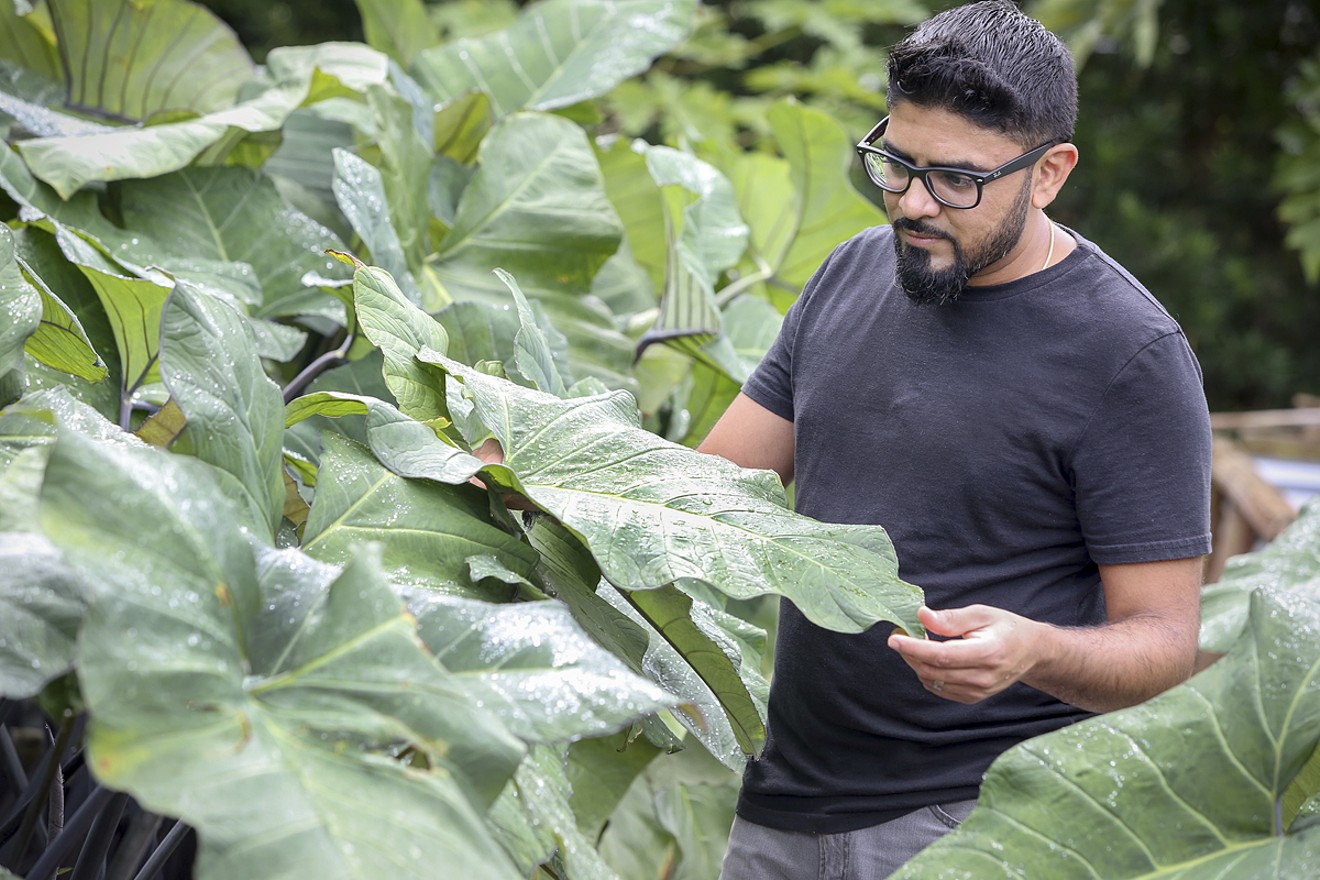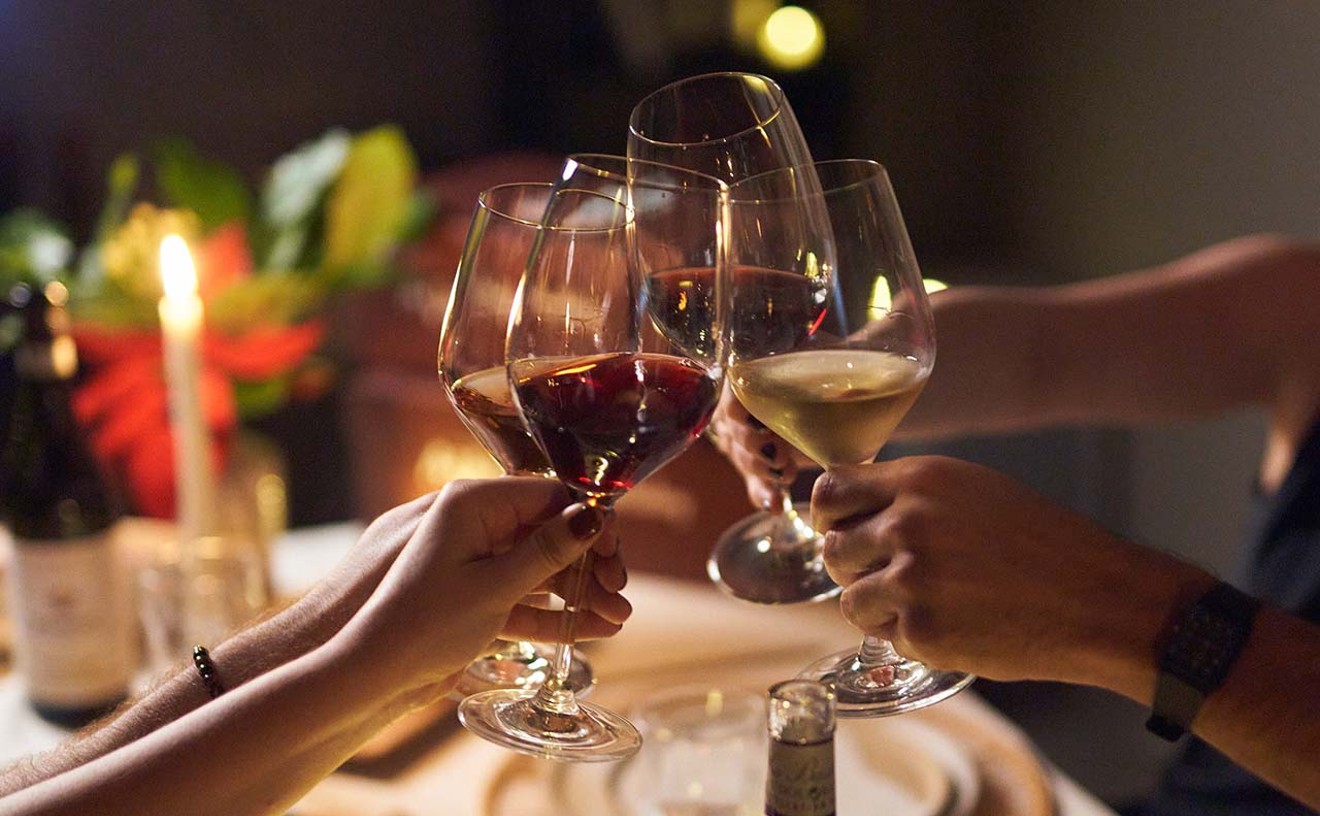Niven and Shivani Patel’s pair of Indian restaurants are more than just two of South Florida’s best places to eat. With vast amounts of the produce for both spots coming from the couple's home farm in Homestead and a recently opened two-acre spread nearby, they are shining examples of all a restaurant can and should be. When the growing season rolls around, the menu bristles with Roman and purple beans, ruffled mountains of greens, spicy radishes, and holy basil. During the summer months, mangoes, starfruit, and lychees appear on a variety of plates.
So it seemed confusing late last month when a post, sponsored by Walmart, appeared on Ghee Indian Kitchen's Instagram espousing avocados and cilantro from the oft-derided retail giant's produce section. The partnership was a two-week affair orbiting around the menu's avocado bhel ($12), in which a crackly heap of puffed rice is coated with mashed avocados and flecked with cilantro and most often crowned with cubes of ruby-red tuna. Niven Patel wouldn't say how much he was paid to promote Florida-grown produce through the restaurant that's become a local, and arguably national, treasure thanks to its commitment to using organic produce grown on farms the chef controls.
"The biggest reservation I would say was that everyone perceives Walmart as a certain kind of brand," Patel says. "My thing is that the more we expose everyone to good food and local produce, it's good for everyone, not just restaurants."
What followed was close analysis of the two producers — Infinite Herbs and King Fresh LLC, which maintains farms in California and South Florida — to ensure both met his standards.
"We visited the farms; I talked to the farmers; I looked at the produce," Patel adds. "For me, it's not about the posts; it's more about the message for people to be aware that it doesn’t have to be out of the norm for someone to get good produce anywhere."
Patel is one in a growing group of Miami chefs who in recent years have partnered with everything from large frozen-food conglomerates to national agricultural promotion boards. Todd Erickson, chef for the now-closed Midtown vegan spot GLAM, is part of Schwan's Company's national chef collective. The company owns everything from Freschetta and Red Baron to Mrs. Smith's and operates a bustling commercial service that can be found in public schools nationwide. Meanwhile, Aaron Brooks of Edge Steak & Bar promotes Australian lamb, while Pubbelly Global cofounder Jose Mendin is often on the road at the behest of the National Pork Board.
What's unclear is whether they're doing it for the money or because they believe in the products they're selling. Most likely, it's some combination of the two. Though it's difficult to ask a chef — part of one of the most high risk, difficult, and underpaid professions — to turn down a payday, the trend also calls into question the role of modern chefs, who at the heights of the profession could serve as a kind of translator between the general public and the ever-more opaque world of food production.
Unless you're one of those cool people who uses a flip phone, you know the influencer economy is huge. A 2018 article in AdWeek estimated it would reach $10 billion this year, while other metrics place the total somewhere between $5 billion and $10 billion. A recently released Statista report shows the global Instagram influencer industry was worth $1.07 billion in 2017 and is expected to hit $2.38 billion by the end of this year. Numbers aside, it appears the public is growing weary of rosy images promoting impossibly fantastic lifestyles. According to a 2017 paper by University of Georgia professor Nathaniel Evans, Instagram users reacted more negatively to clearly labeled ads and were less likely to share the post. Last year, the marketing firm Bazaarvoice conducted a survey of 4,000 consumers in the United Kingdom, France, and Germany and found that nearly half are tired of a never-ending barrage of mobile billboards.
What's more is that the industry is barely regulated, often making it impossible to know whether some posts are ads and whether the people promoting products understand the ins and outs of what they're selling.
"Chefs are the perfect kind of influencers because they have a large number of captive followers who are engaging online, communicating, and really accelerating the word-of-mouth process," says Chen Lou, a professor at Singapore's Nanyang Technological University who studies online marketing across a variety of industries. "The problem is that consumers never really know whether the person they're trusting has done their homework, and there's nothing, no regulations, that force them to do so."
For the Australian-born Brooks of Edge Steak & Bar in Brickell, working with one of his homeland's native products was a natural fit.
"It's a product I put my name behind because I believe in it," he says, but declines to disclose the nature of the financial relationship with Australia's meat-promotion group. "It's something I grew up on. I've been to the farms — I've seen how it's raised, how it's processed — and I've been to the slaughterhouses."
The organization, known in the States as True Aussie Beef & Lamb, has provided generously marbled tenderloins for the restaurant, rib-eyes for its poolside tacos, and a whole lamb that was rubbed with jerk spice and spit-roasted for Brooks' annual Australian Independence Day barbecue.
Though Brooks said he didn't want to discuss too deeply into the nature of livestock-rearing and the issues surrounding it, he says he feels confident in using Australian beef and lamb because he knows how important global trade is to the industry on the other side of the globe.
"There’s only so many mouths in Australia that eat the product. There are many, many more overseas, and if they lose the quality and lose those markets, it can have a massive impact on the farmers," he says. "What's more fun for me is when people say they don't eat lamb — they don't like the flavor — to be able to take something like that and turn it around using different cuts and different cooking techniques is something I find quite cool."
Erickson says he feels the same about helping Schwan's — which earns an estimated $3 billion a year off its frozen-food empire — overhaul its products.
"I was a bit hesitant at first," the chef says. "But I found they were passionate about cleaning up their labels and ingredients, and they've put timelines on getting rid of artificial flavors and colors."
Most chefs and cooks like their jobs because of the instant gratification and feedback. They know almost immediately whether a dish works or requires a tweak; however, at Schwan's, the lead time can be as many as two years, Erickson says, but it's ultimately worth it given the number of people whose diets can be influenced.
"Places like school districts are begging us to come to them to give the students more flavor and variety," he says. "I can only reach so many people with my restaurants, but to be able to touch what America eats and give them healthier options is what was really attractive about it."
That, ultimately, is the greatest potential a chef or cook can achieve. Home cooks have done it over the eons through preservation and the gentle massaging of every piece of the animal and plant into something delicious. At its best, good food can surprise and delight, but it's becoming ever more challenging in this day and age when diners in the United States are so disconnected from the source of their food and distracted by marketing trends.
"I personally believe that good food should be approachable to all, and if it's at Walmart, so be it," Ghee's Patel says. "At the end of the day, my focus is our restaurants and the people who come dine in them. It means the world to me that every person in the world has an amazing experience, and if this helps pave the way for that, then that’s what we do."
[
{
"name": "Air - MediumRectangle - Inline Content - Mobile Display Size",
"component": "19274298",
"insertPoint": "2",
"requiredCountToDisplay": "2"
},{
"name": "Editor Picks",
"component": "17482312",
"insertPoint": "4",
"requiredCountToDisplay": "1"
},{
"name": "Inline Links",
"component": "18711090",
"insertPoint": "8th",
"startingPoint": 8,
"requiredCountToDisplay": "7",
"maxInsertions": 25
},{
"name": "Air - MediumRectangle - Combo - Inline Content",
"component": "17482310",
"insertPoint": "8th",
"startingPoint": 8,
"requiredCountToDisplay": "7",
"maxInsertions": 25
},{
"name": "Inline Links",
"component": "18711090",
"insertPoint": "8th",
"startingPoint": 12,
"requiredCountToDisplay": "11",
"maxInsertions": 25
},{
"name": "Air - Leaderboard Tower - Combo - Inline Content",
"component": "17482313",
"insertPoint": "8th",
"startingPoint": 12,
"requiredCountToDisplay": "11",
"maxInsertions": 25
}
]













